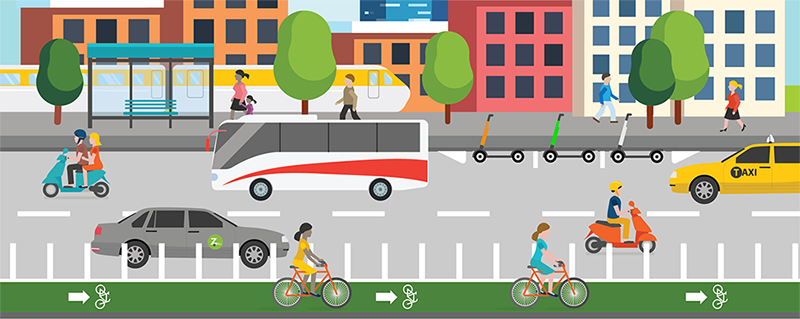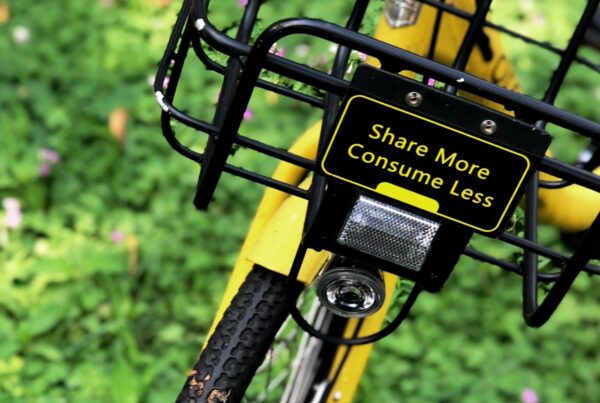Welcome to the Shared-Use Mobility Center’s weekly guide to the most impactful news, thought-provoking articles and innovative technologies that are shaping our transportation future. We believe in sharing information, just like sharing cars, bikes, and scooters, so if there’s anything additional you’d like to see, just drop us a line.
SUMC News and Announcements
New on the MOD Learning Center:
Autonomous Vehicles for Equity Programs: The Linden LEAP AV shuttle pilot
Read how autonomous vehicles are being used to address food barriers in a lower-income, Black community in Columbus, OH. This Shared-Use Mobility Center MOD Learning Center Case Study is an educational portrait of how agencies can overcome internal and external challenges to a pilot without losing the essential goal of the service itself.
Explore the case study.
In case you missed it, we have a new report on Mobility as a Service. It’s a valuable guide to the mobility model’s history, topology, an overview of elements, best practices based on existing hubs, and examples.
Access the report.
You’re invited to ITNAmerica’s 13th Annual Retreat:
“Philanthropy, Research & Technology Drive Community Transportation”
October 21st 11:00am to 3:00pm, EDT
The Independent Transportation Network (ITN) is hosting this virtual event for the public to share, think, and discover innovative shared mobility solutions for Senior Citizens. Among the projects discussed will be ITN’s Mobility on Demand Integrated Mobility Innovation grant-funded accessibility pilot, for which the Shared-Use Mobility Center is providing technical assistance.
Sign up here.
Join us at the Fox Valley Sustainability Network’s
Mobility and Rideshare Webinar
September 24, 1pm – 2pm CT
The Fox Valley Sustainability Network brings together the public and private sectors to create a healthy, sustainable and vibrant Fox Valley, a diverse and widespread region in Northern Illinois.
SUMC Program Manager Alvaro Villagran will offer shared mobility trends and strategies in the wake of COVID-19. He’ll be joined by Jackie Forbes, Chief of Planning and Programming for the Kane County Division of Transportation; who Karen Miller, Executive Planner, Kane County, and Hal Honeyman, Founder, Project Mobility.
Learn more and register.
Fill up your calendar with Federal Transit Administration events
Stay in the know and connect with colleagues at roundtables, webinars, workshops, and more. View the calendar.
Mobility Justice
VIDEO: On September 19, New York City Bike Mayor Courtney Williams brought together mechanics and bike shops to host Brooklyn’s Big Fix Day, repairing over 100 bikes for free in East New York and the surrounding communities—also some of the hardest-hit areas by COVID-19. Streetfilms captured it all.
A Detroit-based nonprofit seized an opportunity to uplift the predominantly-Black NW Goldberg neighborhood by turning a vacant lot by a bus stop into a public park, then added a mural from a local artist depicting “actual residents” gathered there, addressing green space and transit equity.
While creating green space has tremendous positives, like promoting a healthy, active lifestyle and reinforcing neighborhood connections, it can also result in displacement and gentrification when used as a tool for exclusivity and luxury development. Find out how one LA collaborative hopes to change that.
VIDEO: Watch the Cook County Recovery Roundtable: Paving the Road to Equitable Transit that took place on September 17, featuring Cook County Board President Toni Preckwinkle and presenters from the Active Transportation Alliance, Center for Neighborhood Technology, Metropolitan Planning Council, and city and state public officials who discussed transportation equity and pandemic response strategies.
Ridehailing/Carsharing/Carpooling
Capital & Main breaks down the support, opposition, and racial justice ties surrounding the Proposition 22 ballot measure (set for a November 3rd vote) that would sidestep California’s AB5 gig economy bill requiring companies to reclassify their workers as employees instead of independent contractors.
In a bid to create more ride options for workers, Uber’s business-focused platform will now offer carpool trips to employees going in the same general direction as well as a charter service for employers to offer shuttle or bus trips to workers.
Dallas-based ridehailing startup Alto hits Houston streets on October 1, offering rider-centric customizations in the app to tailor trip experiences and with HEPA air filters and plexiglass barriers in vehicles to prevent the spread of COVID-19.
Peer-to-peer carsharing usage is seeing notable growth in British Columbia for Turo, with the company’s latest report showing “an average week-over-week growth rate of 16% for the number of trips booked.”
Bikesharing and Micromobility
The Better Bike Share Partnership reflects on six years of advocating (successfully) for affordable, equitable, and community-building micromobility initiatives and what the future holds for addressing the barriers that bikeshare faces in often-overlooked communities.
New data from CDOT and the Department of Business Affairs and Consumer Protection in Chicago sheds a positive light on sidewalk clutter issues that typically hit dockless scooter pilots in cities, with 311 complaints for the city down a sizeable 60% compared to the 2019 pilot.
Smart Cities Dive catches up with mobility advocate and Visiting Fellow at Harvard Kennedy School David Zipper about how cities can strategically use pilot programs to create transportation opportunities and be evaluated in more accurate and informative terms than “success” and “failure.”
Dutch bike rental company Swapfiet is banking on a more permanent solution to micromobility compared to predominantly pay-as-you-go options like bikeshare or scootersharing. Now operating in over 50 cities with 200,000+ users around Europe, they might be on to something.
Transit
Chicago Mayor Lori Lightfoot has announced that CDOT and the CTA will be launching a pilot to test pop-up dedicated bus lanes for two high-ridership routes to speed up transit in the city’s South and West sides, many of whom, the Mayor said, “do not have the luxury of working from home.”
The Federal Railroad Administration has approved the construction of a high-speed passenger rail line that promises to deliver a 90-minute ride between Houston and Dallas, with the project aimed to break ground in the first half of 2021.
Virginia Gov. Ralph Northam has signed a new law that designates dedicated funding for Hampton Roads Transit, the largest bus network in the commonwealth, while simultaneously launching six new zero-emissions EV buses for the network, a first for the state.
Energy company Enel X will be using grants from the Massachusetts Clean Energy Center to electrify public transportation in the state as they also enter the US public transit market with e-bus infrastructure and solutions services.
Technology
Sidewalk Labs-backed curb management company Coord and the City of Omaha have teamed up for a new pilot program that will use smart loading zones, app-based reservations, and (eventually) demand-based pricing to revamp on-street parking for delivery and taxi/ridehail drivers.
AI enthusiast and Uber alum Francis Kim unravels the strings of full autonomy to set up a possible future where on-demand rides and carsharing options are teleoperated so that your driver or vehicle dropoff is all done through a wireless connection. But what implications does this have on motor vehicle laws, the driver workforce, and the cost of emerging mobility?
A revised version of the SELF Drive act, aimed at boosting nationwide development for autonomous vehicles in the US, is making the rounds in Congress again in part from renewed interest pushed by Rep. Bob Latta (R-Ohio).
Autonomous tech company Waymo will be talking about its work to make autonomous ridehailing more accessible at the at Sight Tech Global (free) virtual event on December 2-3. You can get a small peak at what Waymo has learned from developing self-driving tech to help riders who are blind or low vision on TechCrunch.
Sustainability
Read about several key changes cities can make to desolidify the prevalence of the American SUV to create safer, cleaner, and more space-efficient streets for pedestrians, cyclists, and even drivers on Bloomberg CityLab.
What makes a street resilient to various mobility options? Lyft policy experts Debs Schrimmer and Ron Burke reenvision major transit corridors in Chicago that put people at the forefront of design and infrastructure while giving diverse communities and areas with large portions of essential workers cleaner and safer transportation options.
Scientific American wants to remind you that the frequency of crowding in small areas is far more indicative of the spread of COVID-19 in cities than population density, citing cases where lower-density areas have been host to “superspreader” incidents while high-density cities like Hong Kong, Seoul and Taipei have successfully mitigated outbreaks.
A study from Austrian telematics provider Dolphin Technologies, which looked at 3.2 million car trips by 40,000 people in 2018 and 2019, shows that “a quarter of all accidents occurred during the first three minutes of driving, and another 14% within the first six minutes.”
Requests for Proposals, Inquiries, and Information
Shared-Use Mobility Center Job Postings
See current openings
RFP 21-02 Zero Emission Bus Implementation Study
Alexandria Transit Company (DASH) and the City of Alexandria, Virginia
Alexandria, Virginia
Deadline: October 7, 2020
RFP: Services for the Chestnut Street Multimodal Station, Shared Services Facility & City of Oxford Passenger Rail Platform
Butler County Regional Transit Authority
Oxford, Ohio
Deadline: October 19, 2020
NEW RFP: $200 Million For Renewable Energy Supplier for All City-Owned Buildings
City of Chicago
Chicago, IL
Deadline: November 6, 2020
Did someone forward this to you? Sign up for our newsletter here.




